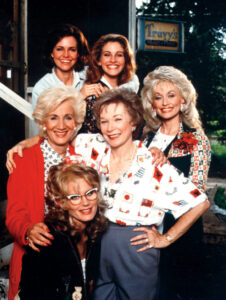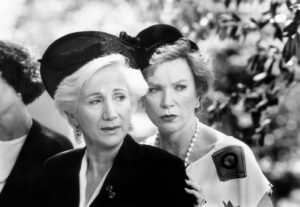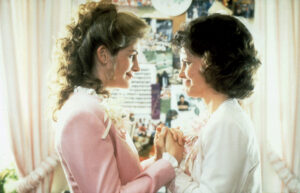
Thirty Years of Steel Magnolias
The untold story of what would
become one of the most beloved
touchstones of Southern culture
This year marks the thirtieth anniversary of Steel Magnolias, a play Robert Harling wrote just months after his sister, Susan, died of complications from diabetes. Written as a tribute to the strength of his sister, his mother, and the coterie of women who supported them, the work broke records at the Lucille Lortel Theatre in Manhattan, where it ran almost three years. It has since been performed in dozens of countries, including Sweden, South Africa, India, South Korea, and Japan. Less than a year into the play’s run, the legendary producer Ray Stark bought the film rights, and in 1988 it was made into a movie starring Sally Field and Julia Roberts as the mother/daughter characters, M’Lynn and Shelby.

STEVE BRODNER
Harling, who grew up in Natchitoches, Louisiana, did not set out to be a playwright. While a student at Tulane University Law School in New Orleans, he sang with a big band and performed in summer community theater. When he graduated, he chose acting over lawyering—“He didn’t even pick up his diploma,” says his dad, Bob Harling—and moved to Manhattan with a promise of a month or two of support from his parents. He arrived in 1977 without a coat in the middle of a snowstorm. “I cried for an afternoon,” he says, “and then I got the list of auditions.” He had some success in regional theater and was cast in lots of commercials (his agent told him he had a great “food face,” meaning he was photogenic even while eating). Then, eight years after his arrival, his beloved younger sister, Susan, who had been a diabetic since she was twelve, got sick. Harling’s mother donated one of her kidneys, but in the end, the transplant couldn’t save her daughter.

ROBERT HARLING Susan was incredibly supportive after I came to New York. She was familiar with my frustration in terms of auditions, and she used to say, “You know what really makes me mad is the fact that I can’t do anything for you. I can make food for Johnny [Harling’s younger brother], I can whip Mama and Daddy into line, but I don’t know how to help you, and I wish I could.” Even when she was sick, she’d come home from the hospital and make a box of brownies and send them to me.
Everything they talk about in the play is true. Not every diabetic is the same, but because of her particular condition, the doctors were concerned that carrying a child would affect her. But she wanted a child, she went ahead and had a child, and then, sure enough, her metabolism started to fail—circulatory system, kidneys, the whole thing. It was much grimmer than I portrayed it in the play. Nobody could sit through the actual health dilemmas that my sister went through. It was so powerful to me because here was this incredibly strong woman—my mother—who had really fought Susan when she said she was going to try to have a baby. And now here was Susan having to turn back to her and say, “Mama, you need to help me now.” When she needed a kidney, we were all tested to see if we were matches, but my mom basically said the buck stops here, and that’s how it was.
The last time I talked to Susan was on her birthday, October 7 [1985]. She was on dialysis and they were going to put in some shunts to facilitate it, and that required some minor surgery. I actually had to get off the call because I was going to an audition. She said, “Good luck,” and they rolled her down to the operating room. She never woke up, and I told her story.

Harling says he went to a place of “rage and anger,” a state exacerbated by the fact that his sister’s widower remarried shortly after her death. Even more difficult was the fact that his nephew began calling his stepmother “Mama.” Harling was afraid Susan would be forgotten.
The Steel Magnolias ensemble on set.
ROBERT HARLING I had two dear friends, Kathy and Michael Weller. Michael is a wonderful playwright [Moonchildren, Spoils of War]. They saw what I was going through, and Michael suggested I write something. Such a saga of strength and tolerance had gone on, and I kept saying, “This kid won’t know anything about it.” I wasn’t a writer, so I fought that demon for a while and then one day I said, “Why not?” I’d planned to write a short story, and I was a couple of pages into it when I realized I wasn’t capturing the way these women talked. So I started writing in dialogue form. When I was a kid, the mystique of the beauty parlor was that guys were never allowed. You didn’t know what went on in there, and they all came back different somehow. I realized this hermetically sealed environment would be the best place to have these women express their true feelings. After my sister’s funeral, everybody came over to the house, and there was all this food. I was watching the men in the den, and they were a mess. My dad couldn’t talk about anything; none of them knew
